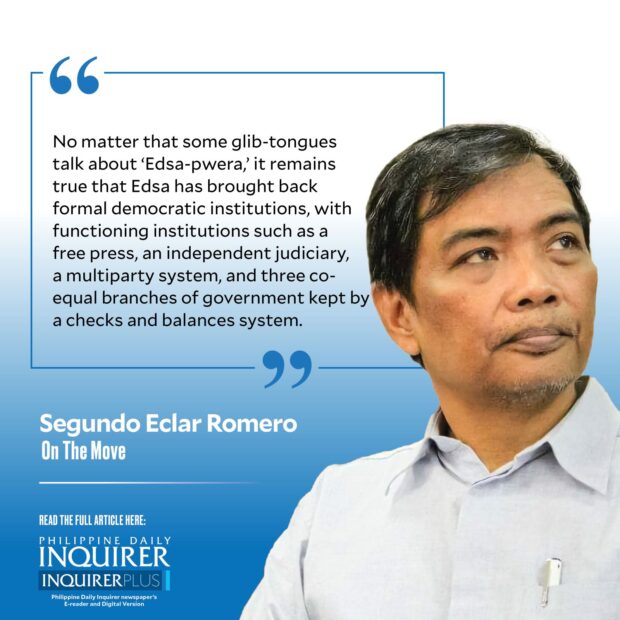Edsa 1986: All for nothing?

The election of Ferdinand “Bongbong” Marcos Jr. to the presidency in 2022 has been jarring enough to Filipinos who thought the 1986 Edsa People Power Revolution was the final deliverance from authoritarian rule. It had come at a great sacrifice, not only for the whole nation but for those thousands who chose to stand up against the dictator, notably Benigno “Ninoy” Aquino Jr. who was brutally murdered in 1983. From the mammoth 12-hour funeral display of the people’s anger to the people power revolt, it took the Filipino people just three years to gather the storm that would sweep the Marcoses from Malacañang.
It is clear we are now waging an Edsa 2. This is a battle for the memory of Edsa and against historical revisionism, of upholding the meaning of all the sacrifices the nation suffered and the risks the people took. The return of the Marcoses during the term of President Fidel V. Ramos was the Trojan horse moment. From then on, the Marcoses squeezed all that the 1987 Constitution offered by way of civil, political, economic, and social rights to rehabilitate their name and restore their political power. It was not a difficult task—they had all the plundered wealth to invest in the grand scheme.
For the financial support the Marcoses provided, Rodrigo Duterte allowed the burial of Marcos Sr. at the Libingan ng Mga Bayani in 2016, a mental dissonance of epic proportions. Chased out of the country, the dictator is now ensconced in the pantheon of Filipino heroes.
Edsa 2 is about protecting our memory of Edsa, of our people voicing their abhorrence of authoritarian rule. It is about pushing back against the Marcos administration’s gambit to consign Edsa to the dustbin of insignificance and oblivion.
Beyond the symbolism and significance of Edsa, however, there are patterns of collective will and action that have taken root because of Edsa. No matter that some glib-tongues talk about “Edsa-pwera,” it remains true that Edsa has brought back formal democratic institutions, with functioning institutions such as a free press, an independent judiciary, a multiparty system, and three co-equal branches of government kept by a checks and balances system. The Philippines has witnessed significant economic growth since 1986 even though poverty and inequality have festered. Civil society has been vibrant and the media free despite herculean efforts during the Duterte administration to muzzle it. Sure, Philippine democracy has visible dents and signs of corrosion, but it has worked.
There was even enough political elbow room to experiment with dangerous outliers like Joseph “Erap” Estrada and Duterte. Perhaps the best legacy of Edsa is Marcos Jr., who, defying preconceived notions he will be as dictatorial and kleptocratic as his father, has surprisingly abided by the available political, legal, and other controls of the Constitution. Even his “New Philippines” does not spell the imagined malevolence of his father’s New Society. The Charter change attempt initiated by his minions was checkmated, even if it meanders looking for an extra-legal pathway to fruition. Malacañang’s official bypass of the commemoration of Edsa did not prevent the resounding ridicule of the Edsa-pwera salvo that initiated the media campaign to change the Constitution.
Most of all, the Marcos Jr. victory in May 2022, no matter how grotesque to many, can still be seen as the normal functioning of a democratic system where voters are free to choose their leaders, notwithstanding the imperfections of the Philippine electoral system.
But the best legacy of Edsa is how it has eventually returned the military to the barracks. Those uncertain days of six successive coups under Cory Aquino’s presidency tapered off after the Oakwood Mutiny against President Gloria Macapagal Arroyo in 2003. The military today singlemindedly finds pride and meaning in its role of protecting Philippine sovereignty from both external and internal threats.
The legacy of Edsa is how the military, even with blandishments from Duterte, refused to join his war on drugs without a legal written order, in stark contrast to the Philippine National Police which went along for the ride with nothing more than verbal urgings.
When one looks at nations, including in Asean, experiencing excruciating turmoil as the military takes over democratic governments, one realizes that the legacy of Edsa is the Filipino people doggedly stumbling, fumbling, and jostling peacefully toward the possible dream of a Philippine democracy of all, for all, because by all.
doyromero@gmail.com




















